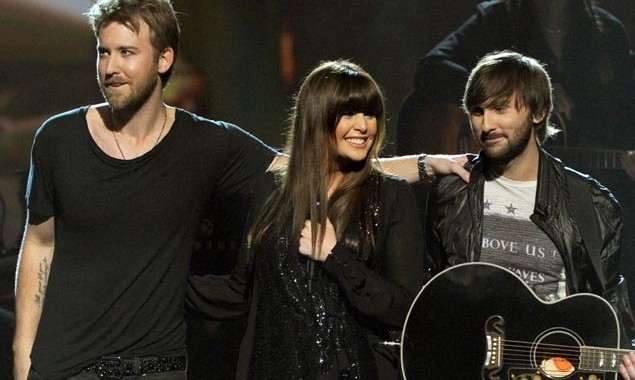Most songs, if they are one of several possible verse-chorus formats, usually start with a verse, and before the 1-minute mark will move on to the chorus.
The timing involved with this — i.e., the fact that we usually hear the chorus at or before the 1-minute mark, as you hear in a song like Lady Antebellum’s “Just a Kiss”, which happens at exactly 60 seconds — is an important feature of popular songwriting. As you know, verses are often low-energy, story-telling elements, while choruses are higher-energy, emotional events.
And as you likely also know, if you spend too much time in the verse, listeners can become disinterested. It’s why the expression “Don’t bore us — get to the chorus” is an adage that most songwriters follow. If you’re taking longer than 1 minute to get to the chorus, you need to have a good reason for it.
And there are good reasons why it may take longer than a minute for the chorus to arrive, two of which are:
- The tempo is slow. Slow ballad-like songs mean that all the composite parts of a song might get stretched.
- The intro is long. Some songs might feature an intro that incorporates an instrumental solo, for example, meaning that you don’t really even get to the verse until the 30-second-or-later mark.
Depending on how you look at it, the component of any song that stands out as most important is usually the chorus. When all is said and done, the chorus is the part of a song that people remember, that everyone hums, and that everyone identifies as being “the song.”
 “Hooks and Riffs: How They Grab Attention, Make Songs Memorable, and Build Your Fan Base” show you the secrets of how the hook has made some of the world’s best songs so successful. And more importantly, how you can create a hook that turns your song into a winner. Part of the 10-eBook Deluxe Bundle package. READ MORE
“Hooks and Riffs: How They Grab Attention, Make Songs Memorable, and Build Your Fan Base” show you the secrets of how the hook has made some of the world’s best songs so successful. And more importantly, how you can create a hook that turns your song into a winner. Part of the 10-eBook Deluxe Bundle package. READ MORE
As listeners, we’re usually much more forgiving of a verse that rambles, or lacks strong hook-like elements. But a chorus? There needs to be something that stands out and waves a flag. Having a strong hook in a chorus is, in many songwriters’ minds, so important that many use the words hook and chorus interchangeably in conversation.
Why is it that a chorus surpasses a verse in importance? It has to do with music’s ability to generate emotional energy. We like music that causes us to experience strong feelings, but we like there to be an ebb and flow to that emotional level. Songs that are intense from start to finish tend to dull our senses when it comes to feeling emotional intensity.
There is no rule to follow here, only historical experience: a majority of hit songs from the past 5 or 6 decades do the following:
- Start with a verse that describes the beginning of a story, relationship or situation: generally low in emotional energy, but building as it goes. If it doesn’t build sufficiently, the songwriter might tag a pre-chorus at the end of the verse.
- Move to the chorus, and allow fuller, deeper emotions to come to the fore.
- Return to a second verse, allowing emotions to diminish.
- Follow up with a chorus that builds emotional levels again.
- Follow with a bridge, that, depending on the overall emotions of the song, might take emotions even higher, or might allow them to dissipate.
- Return to the chorus to build emotional levels again.
As you know, there are many variations on this basic format, but all designs are meant to do the same thing: allow the emotion of a song to rise and fall. Through it all, whatever happens in the chorus winds up being more important to the overall success of a song than what happens anywhere else.
This isn’t permission to write a lousy verse, of course. Verses and choruses need to be carefully paired so that one leads smoothly to the other. And you’d have to agree that the verse of “Just a Kiss” is clearly beautifully written and beautifully performed.
But when all is said and done, it’s the chorus that needs to have the strongest hook, with the simplest melodic and harmonic design. Verses can meander and wander around, but choruses need something that’s easy for audiences to hum, and easy for them to remember.
 Written by Gary Ewer. Follow Gary on Twitter.
Written by Gary Ewer. Follow Gary on Twitter.
 Get “The Essential Secrets of Songwriting” 10-eBook Deluxe Bundle. Everything you need to know about songwriting – from writing melodies, lyrics, creating chord progressions, protecting your songs, etc… It’s all there. Right now, get the SPECIAL DEAL on this bundle package.
Get “The Essential Secrets of Songwriting” 10-eBook Deluxe Bundle. Everything you need to know about songwriting – from writing melodies, lyrics, creating chord progressions, protecting your songs, etc… It’s all there. Right now, get the SPECIAL DEAL on this bundle package.











I believe that the verses (lyrics) are cardinal to a great song. Yes, you want a good chorus (hook), but a chorus (hook) is often, usually, just empty calories. It’s the cliff notes to the story but not the story just the basic highlights (gist). A chorus (hook) can’t tell your story. It lacks the detail and depth to have deep impact on the listene. As I said before empty calories. Yes, it tastes good and you enjoy it, but lacks the nutrients to really sustain you. I’ve heard hit songs that I liked, but I thought were seriously lyrically lacking. It was just an infectiously catchy hook and filler. Some poor badly written lyrics with a great beat (track) behind them. The verses (lyrics) in those songs have me going, “like really”. I personally am a lyricist, but also, a music lover, and in my many years of a love affair with musi,.I’ve heard many great songs with wonderfully written lyrics, from wonderful song writers. Those found on the list of the greatest song writers are lauded for their storytelling, their lyrics, and the details found within. Great lyrics can move you, can draw you in, and give you a sense of community, because you relate to the story (details). A chorus or hook can’t do that. Now, your verse (lyrics) don’t have to be high art, but they do have to be well crafted and fit your song . I myself, personally, try to write good lyrics, to have strong lyrical content, that represents and relates to the song and that is impactful upon the listener- unless I’m writing a lighthearted, fun song, but even in that instance, I’m still trying to write well crafted lyrics. I feel lyrics are important to a great song and effect the quality thereof.